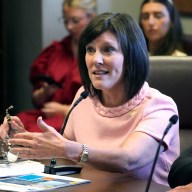By Angus Berwick
MADRID (Reuters) – Sitting outside the scruffy political science faculty of Madrid’s Complutense University, Elena Jimenez is exactly the sort of dissatisfied Spaniard who was inspired to vote last December for new parties that promised a change. But for this month’s repeat national election, the 28-year-old doctoral student says she will stay at home – probably one of many as pollsters predict abstention to be the highest since Spain returned to democracy in the mid-1970s. Convincing people like Jimenez to vote in the June 26 election — triggered after political leaders failed to form a coalition government — has become key for parties as they seek to win the handful of parliamentary seats they need to unlock a six-month stalemate and reach a majority. Jimenez said the parties’ bickering and their reluctance to compromise had stifled the enthusiasm she and her fellow students felt in December when she voted for anti-austerity party Podemos, whose leader Pablo Iglesias once taught in the university’s graffiti-covered lecture halls. “I voted looking for change but we have achieved absolutely nothing and for that reason I will abstain,” she said.
The enthusiasm, or lack of it, from voters like Jimenez will affect the way Spanish politics function in the future as newly-formed parties such as Podemos try to unseat the establishment that presided over Spain’s economic crisis. Polls see the ruling conservative People’s Party (PP) winning the vote, followed by the Unidos Podemos alliance, the Socialist Party and the other newcomer, Ciudadanos. However, no party is expected to come close to a majority of 176 seats. With abstention predicted to be about 5 percentage points higher than in December, the election outcome remains uncertain. A future government will likely be decided by party negotiations over which coalition can reach the majority, with just a small number of seats dictating who comes out on top. DISENCHANTED YOUNG VOTERS
Pollster Metroscopia forecasts that between 30 and 32 percent of Spaniards will abstain, making them the biggest bloc. Such a wave of voter apathy would boost the prospects of the PP and hit their long-time Socialist opponents who are struggling to motivate a depressed party base. “If there is greater abstention, this will favor the PP since they have the most loyal, faithful and mobilized electorate,” Metroscopia analyst Francisco Camas said.
A better turnout than expected is likely to help business-friendly Ciudadanos and Podemos, who last month joined forces with a former communist party, overtaking the Socialists as the largest left-wing force. Both new parties’ voters are more prone to abstention since on average they are much younger than others, with almost 20 years separating those from the PP and Podemos. Metroscopia estimates only 56 percent of 18 to 34-year-olds will vote. Still stuck with the second highest unemployment rate in the euro zone, young people have yet to benefit from Spain’s economic recovery and their discontent has only risen since December.
Over 42 percent of 18 to 34-year-olds now rate the political situation “very bad,” against 34 percent last November, data from the state polling agency shows.
CONQUERING ABSTENTION
Faced with this, parties have unfurled a variety of unorthodox strategies to jazz up their appeal and gain the support of groups they previously had given up as lost.
In a series of television adverts, acting Prime Minister Mariano Rajoy, for instance, has taken to power-walking across the Spanish landscape dressed in shorts and trainers to better connect with his voters. Meanwhile, the Podemos alliance has tried to lure the uninterested young by printing its 195-page electoral program in a catalog modeled on one from Swedish furniture giant Ikea. Politicians are candidly pictured playing chess, slicing cheese and gardening, alongside summaries of their policies. In a bid to win votes from traditional parties’ political heartland, Podemos has also dispatched a roving “rural caravan” across Spain’s countryside, foreign territory to many of its city-focused politicians and whose voters have an outsized impact on elections due to a skewed electoral system. “The locals approach and see people from Podemos who they only have ever seen on television,” said the caravan’s coordinator, Ariel Jerez, in the hilltop town of Siguenza, a PP stronghold about 100 km northeast of Madrid. SOCIALISTS LOSING
While the PP can count on rural areas like Siguenza and wealthy urban districts to shore up its vote, the Socialists stand to lose out. According to Metroscopia’s Camas, their failure to mobilize younger supporters has been one of the main factors in driving up the expected abstention rate. At an event in Madrid’s hip Malasana district attended by the Socialist leader Pedro Sanchez, who notched the party’s worst ever election result last December, a group of downbeat young volunteers handed out fliers as rock music from a nearby Podemos gathering drowned out their voices. In a bar close by, Angeles Alvarez, a Socialist parliamentary candidate, said it was true that the party had disconnected from a lot of young people who had drifted towards Podemos and their more reactionary politics. “It is one of the Socialist party’s greatest problems,” she said.
Even Sanchez admitted as much in a speech this month.
“The Socialist party’s adversary is not Podemos or the PP, our challenge is going to vote, our challenge is conquering abstention,” he said.
(This version of the story corrects the surname from “Jimen” to “Jimenez” throughout)
(Editing by Julien Toyer and Angus MacSwan)


















